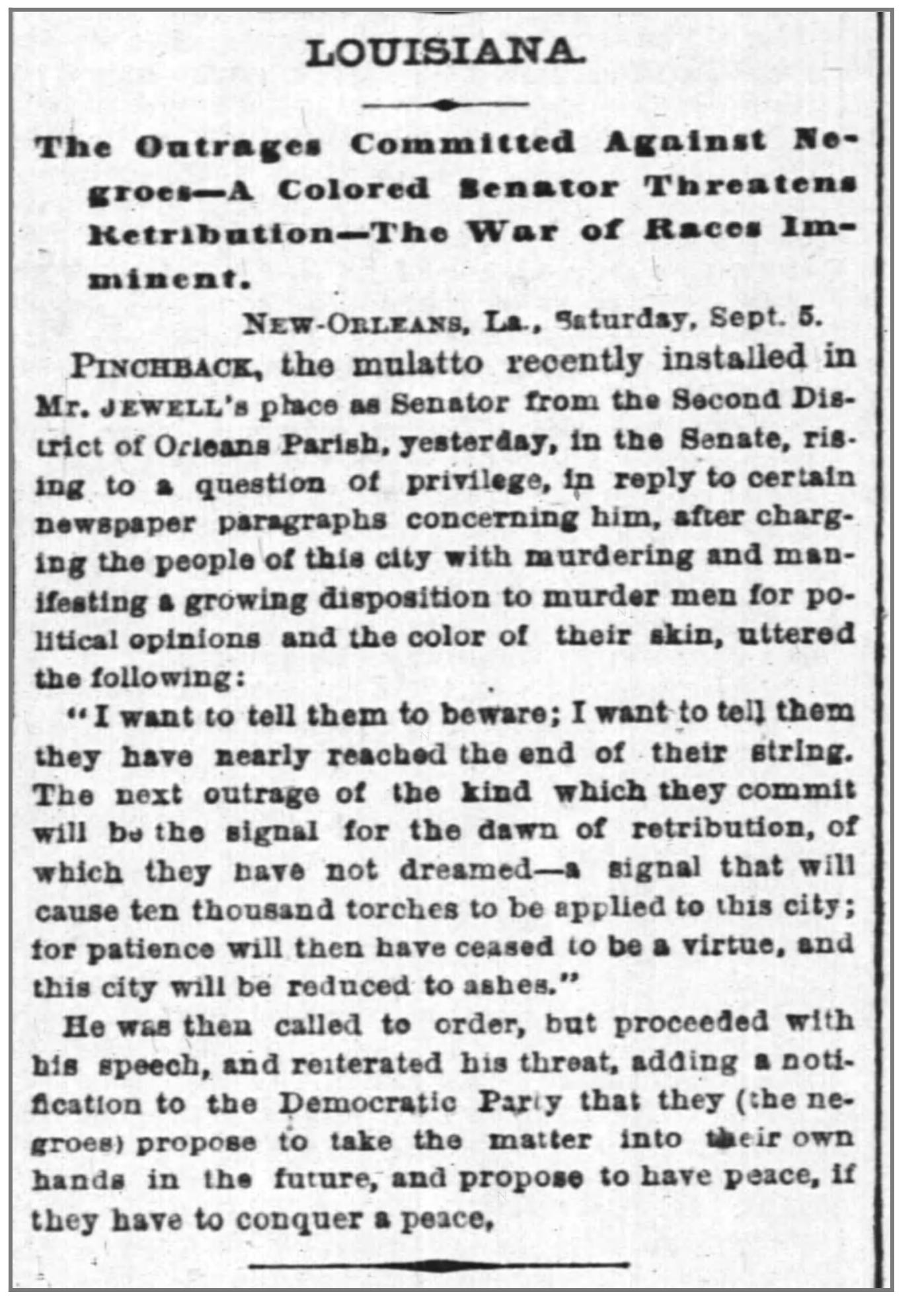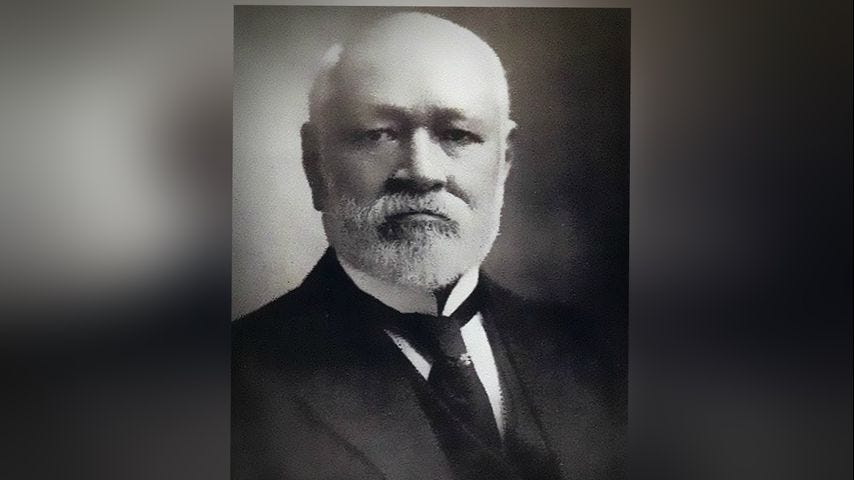Before diving into Pinchback, I first would like to thank all of you for your patience while I’ve been away.

We still have not located my cousin and my emotional and physical energy has been completely dedicated to that. It’s been very hard to focus on anything else and seemed futile to write these pieces during this time. But with not knowing when she will be found, I have to keep moving forward.
I subtitled this article the 2nd Black Governor of Louisiana because after doing more research on Oscar Dunn. See article below.
I learned that it was a misconception that P.B.S. Pinchback was the first Black Governor. Both Dunn and Pinchback were acting governors, making Dunn the first Black governor.
Their stories really intertwined. It was Pinchback that recommended to Henry C. Warmoth who was running for governor at the time, that he should put Dunn on his running ticket but as Pinchback’s interests changed over the time while Dunn was in office, he went from advocate to adversary.
Pinchback is the one that brought news to Dunn that he had an unflattering story of Dunn and was going to release this information to the public which would threaten his possibility of re-election.
“There is a strong possibility that Pinchback discovered that Dunn had boarded with his wife and her former husband. Having been a boarder in the home prior to each of the children‘s births, Pinchback may have insinuated that the couple engaged in an adulterous relationship and thereby put into question the legitimacy of all three of Ellen‘s children and the character of Dunn‘s highly regarded spouse. This sort of revelation, true or false, could have been socially and politically disastrous for Dunn‘s family.” - Brian K. Mitchell - Oscar James Dunn: A Case Study in Race & Politics in Reconstruction Louisiana
Some even speculate that Pinchback may have poisoned Dunn which led to Dunn’s untimely death. Some even believe that Dunn, himself, may have taken his own life in order to not have the embarrassing news released. We will never know the truth. As I mentioned in my article on Dunn, his family decided to not do an autopsy.
Who is Pinchback?
Who is this man with such great political ambition that it may have caused the downfall of Oscar Dunn?
Pickney Benton Stewart Pinchback, born free, May 10, 1837 in Macon, Georgia to Eliza Stewart and her master, William Pinchback, a white planter. William raised Pickney as his own with his other children. After William’s death in 1848, Eliza took the children to the free state of Ohio in order for them to remain free.
During The Civil War, Pinchback traveled to Union-Occupied New Orleans where he raised several companies for the 1st Louisiana Native Guard and he became one of the first African Americans commissioned as officers in the Union Army.
After the war, Pinchback, a Republican, became very involved in Louisiana politics. In 1868, he was elected to Louisiana’s State Senate and became the president pro tempore of the state senate.
The Reconstruction Era was a very volatile time and Louisiana was no different. There were many uprisings of angry whites doing whatever they could to regain political power of the state.
One thing that I didn’t know when I wrote about Oscar Dunn was that while he was in charge of the police force while he was Lt. Governor, he appointed 243 Black officers and 130 white officers. I wish I could find a photo of this. The visual of that alone is just impressive for that time period.
With this happening along with the already high racial tensions, Pinchback warned Democrats who considered violence against Republicans.
“I want to tell them to beware; I want to tell them they have nearly reached the end of their string. The next outrage of the kind which they commit will be the signal for the dawn of retribution, of which they have not dreamed - a signal that will cause ten thousand torches to be applied to this city; for patience will then have ceased to be a virtue, and this city will be reduced to ashes.” - Pinchback
Tensions continued to rise with white supremacist Democrats, blood was shed during a number of encounters. *Eric Foner wrote, "...every election [in Louisiana] between 1868 and 1876 was marked by rampant violence and pervasive fraud."
So much so, that many of the Blacks appointed officers resigned for fear of their lives. And while Dunn tried to get the Civil Rights Bill passed, which would protect Blacks when voting, Warmoth declined. If you remember from my article on Oscar Dunn, Governor Warmoth got into office because of the Black vote and Dunn felt betrayed by him.
Pinchback, an ardent supporter of Warmoth, continued to support him. And though, Pinchback initially recommended Dunn for office, they became rivals. I find it ironic that Pinchback became acting Lieutenant Governor after the death of Oscar Dunn.
In 1872, impeachment charges were filed against Governor Warmoth. Pinchback rose to acting governor by way of article 53 of the Louisiana Constitution of 1868, which stated that the lieutenant governor would assume the duties of the governor in case of impeachment of the Governor, his removal from office, death, resignation or absence from the state. Very much like Dunn became acting Governor when Warmoth was away because of an injury.
Pinchback served as governor for 6 weeks which is the remaining amount of Warmoth’s term. Warmoth was not convicted and the charges were dropped.
As with most of the south during Reconstruction in the 1870s, the White League continued with their terror, violence, and voter intimidation to suppress the Black vote. The next governor of Louisiana was Davidson Penn, a former Confederate officer.
P.B.S. Pinchback incidentally had also been elected to the U.S. House of Representatives but opted for the Senate. If all had gone according to plan, Pinchback would have been sworn in March 4, 1873. However, opposition mounted and Pinchback found himself in allegations of political corruption.
According to Eric Foner, in *Reconstruction: America’s Unfinished Revolution, 1863-1877, as governor, Pinchback had profited from a public land deal, speculated on insider information and otherwise fed off the patronage system.
Pinchback was very open about his participations in corruption.
“On Nov. 21, 1925, the Chicago Defender recalled how he was once asked, “Governor, how much do you think the delegates I told you about yesterday would sell out for?” To which “Pinchback, high-spirited, proud and unbending soul that he was, answered, ‘Senator, I cannot tell you that. I am used to buying votes, not selling them.’”
Can you believe he actually admitted that?
Later in life, Pinchback, left politics and decided to study law in 1885. He was admitted to the Louisiana bar in 1886 but never practiced.
In 1892, he moved his family to Washington D.C. and very wealthy from his possessions and settlements from the Senate. He was part of the mixed-race elite of DC. He later became a U.S. Marshal. Pinchback died in 1921 and by that time, little was known about his political history.
I’m so perplexed or yet intrigued by Pinchback’s psyche. There is an out of print book on him that I plan on buying a used copy of. Here’s a man, that clearly could have passed for white during that time and was even encourage to do so by one of his sisters when he was dealing with discrimination. Yet, he chose to be recognized as a Black man. But there were many accounts where he did not support the rights of Black people. So, why be Black and not support the causes of Black people? And on top of that turned out to allegedly commit crimes. Correction, he did admit to buying votes.
There’s so much more to explore with Dunn, Pinchback and Louisiana during Reconstruction. Some of you requested some of Dunn’s speeches. I think I have a resource for at least some excerpts. I will try to get that out to you before the next meeting.
Speaking of meetings, our monthly meeting for paid subscribers will be at 11 am (pst) Sat, November 2, 2024.
Normally, they are the last Saturday of the month. I have a memorial to go to this Saturday, so I have to push it by a week. And if interested, I can do December’s meeting the first Saturday of the month as well, because holidays are interfering with the end of the month. Let me know what you think.
Hope you all are well and I look forward to hearing your thoughts!
If you like this article, please ❤️ , comment and share. It helps the algos.
Best,
Danita
Resources
Virginia Commonwealth University
“Oscar James Dunn: A Case Study in Race & Politics in Reconstruction Louisiana” Brian K Mitchell
*Monumental: Oscar Dunn and His Radical Fight In Reconstruction Louisiana
*Any links to books are affiliate links










How wild is this piece of history it's really amazing how much has been printed but never shared with the public we really don't know a lot. I loved your flowers at the top of this piece. :) They set a tone. lol.